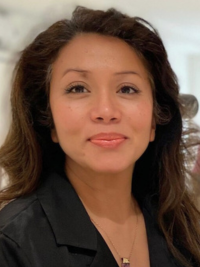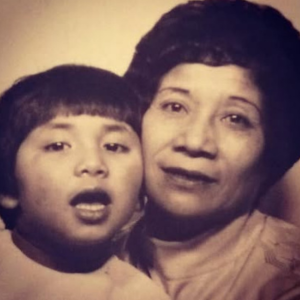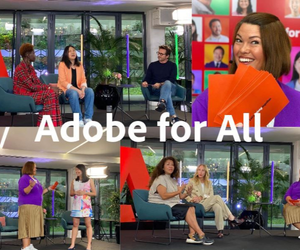Christina Vaughan is a Sheffield-born entrepreneur and passionate advocate for inclusive visual storytelling. With over two decades’ experience in the global stock photography industry, she founded Cultura Creative in 2021 to champion diverse, ethical imagery that challenges stereotypes and promotes equity, diversity and inclusion (EDI). Her pioneering work now extends into cutting-edge AI tools designed to combat algorithmic bias and reshape how stories are visually told in advertising, media and tech.

“Images define who we see as powerful, beautiful, capable and worthy.”
A working-class upbringing shaped by education and culture

Growing up in Sheffield in a working-class, mixed-heritage family shaped my outlook deeply — my father was a steelworker turned railwayman, and my mother, originally a tribal leader from Mizoram, settled in Sheffield in the 1960s. Education was seen as the key to opportunity, and I was the first in my family to attend university away from home, studying European studies (French and Spanish) in London. This early love of culture and language laid the foundation for my career in visual content.
My professional journey began at The Telegraph Colour Library, a pioneer in stock photography at the time. In 1999, I founded Image Source, a high-end photography agency that grew over 20 years into a global business with offices in London, New York, Cologne and Los Angeles. Our international network included over 240 agents across 80 countries, and at our peak we employed 150 people. We were honoured with a Queen’s Award for Enterprise in International Trade, among other accolades. I also served three terms as President of CEPIC, the European Picture Industry Federation — the first woman of colour and youngest person to hold that role. After 34 years in London, including extended time in the US and Germany, I moved back to Sheffield during the pandemic, marking a new chapter personally and professionally.
Founding Cultura Creative to challenge exclusion in imagery
Cultura Creative was born from both personal conviction and an urgent industry need. Years in stock photography showed me just how damaging the lack of inclusive imagery can be — not only in advertising but in shaping how people see themselves and others.
In 2021, I launched Cultura to create premium, representative and ethical visual content produced by and for diverse communities. Based in Sheffield, I wanted to bring my global experience back to my hometown. My role blends creative direction, strategy and fundraising. I lead partnerships, oversee visual and editorial output, and drive innovation — especially with CulturAI.ai, our platform for building ethical AI datasets to combat algorithmic bias. I also mentor creatives, advocate for inclusion in tech and media, and remain hands-on with production and investor pitching.
Why inclusive imagery is vital for EDI
Images hold immense power — they define who we see as powerful, beautiful, capable and worthy. Without inclusive representation, entire communities remain invisible or trapped in stereotypes.
EDI is far more than a corporate tick-box; it’s a cultural shift. Visual representation normalises diversity in every context — from boardrooms to families, athletes to artists — sending a message that everyone belongs. Changing imagery challenges the biases embedded not only in our collective consciousness but also in algorithms shaping media and marketing.
The EDI backlash in the US and its global ripple effects
The backlash against EDI in the US has caused hesitation and fear among some companies, particularly those who once viewed diversity as brand equity. The politicisation of inclusion means some organisations are pulling back to avoid being labelled ‘too woke’.
This approach carries risks to brand reputation, staff retention and consumer trust. Many companies are struggling to navigate this tightrope. The ripple effect is felt worldwide, especially in tech and finance sectors where American leadership influences global trends. This underscores that EDI is not a trend but a long-term commitment requiring courage and strategic vision.
How progressive companies are standing firm
The most progressive companies are doubling down on inclusion — but in more embedded and strategic ways. They integrate diversity into core product design, marketing and talent pipelines instead of relying on statements alone.

Brands like Ben & Jerry’s, Patagonia and Adobe have held their ground. Newer AI and media companies partner with Cultura Creative to ensure diversity is built into products and campaigns from the start, not added as an afterthought. These efforts may not always be loud, but those serious about inclusion are innovating and progressing steadily.
Hope in the face of challenge
What gives me hope is people — especially the younger generation, who demand honesty, representation and fairness from brands, employers and media.
I’m inspired by the creative talent we work with — photographers, models, coders and strategists from underrepresented communities ready to shape the future. Returning to Sheffield has also been a source of optimism. The city’s resilience fuels a quiet revolution where culture, technology and inclusivity intersect in powerful ways.
Connecting with Cultura Creative and what’s next
You can explore our work at www.culturacreative.com and follow us on Instagram and LinkedIn @culturacreative. Whether you’re a brand, creative or advocate for fair and inclusive storytelling, I welcome connection — message me via the website or LinkedIn for meaningful conversations.
Looking ahead, there’s much to be excited about. We recently launched CulturAI.ai, our ethical dataset platform, and I’m producing a podcast, Diversifying the Lens, which amplifies underrepresented voices across sport, fashion, business and arts.
Personally, I’m also reinventing Miss South Yorkshire 2025 with celebrity photographer Alan Strutt — transforming it into a purpose-led celebration of creativity and confidence to empower women. This joyful reimagining celebrates women and female allyship, far from traditional pageants.
Beyond work, I enjoy life with my extended family and three dogs. As the youngest of ten siblings, I have many nieces, nephews and great-nieces and nephews, and I’m rediscovering the outdoors in the Peak District. Balancing impact with peace is something I’m learning to embrace.





